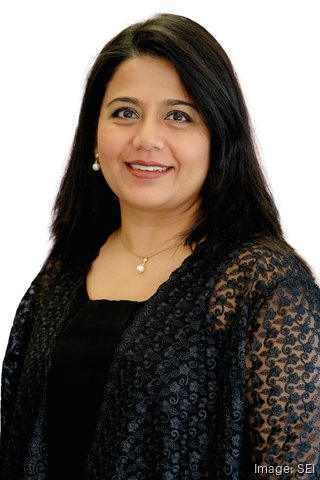Listen to this article 5 min
SEI Investments Co.'s Sneha Shah has held leadership roles on an international level with organizations like the London Stock Exchange Group and Thomson Reuters, and she's now immersing herself in Philadelphia's tech scene and looking to make investments in startups.
Shah is in her first year as executive vice president and head of new business ventures for the Oaks-based financial technology firm. It's a newly created role in which Shah is building out a team that will look to invest in and grow startups that can ultimately be an asset to SEI's (NASDAQ: SEI) operations and financial position. The fintech firm has some $1.5 trillion in assets under management and 5,000 employees globally.
Originally from Kenya, Shah spent over 17 years at Thomson Reuters where she became a managing director in Africa, then a managing director at Thomson Reuters spinout Refinitiv before managing director of the London Stock Exchange Group's business accelerator. She was appointed to the newly created role at SEI last June.
As head of new business ventures, Shah sees opportunity to commercialize ideas both internally and externally. One way is through internal business incubation, or accelerating ideas that originate from within SEI to see what can scale on its own. The company, which refers to its workers as "employee entrepreneurs," formed an employee group, "Seismic" to help foster those innovative ideas.
The second is a venture studio, a "really important part of the muscle that we're building," Shah said. With the venture studio, the firm will look to make investments as a strategic investor in booming startups that it can scale through SEI's existing reach.
"As much as we're going to have great ideas inside, in some of these fast-growing areas, the innovation outside is happening faster than we can do inside," Shah said, pointing to emerging technologies like artificial intelligence as one example. "But a lot of these startups don't have the distribution and scale that SEI has and so our entire ventures thesis is very strategic."
Under Shah, SEI in February made a $10 million strategic investment in TIFIN, a New York provider of asset and wealth management platforms that focus on the use of AI, data tools and other technology.

That first major investment under Shah in some ways serves as a view into how she'll approach her role moving forward. Major boxes to check for startups before investing include: Does the startup align with SEI's strategy and the direction of the innovation happening in the fintech industry? Is the founder credible and trustworthy? Can SEI add value beyond financing through technology, talent or distribution scale? Are they growing faster than SEI or its competitors?
"Because if they're not high growth, then we could probably do it better ourselves," Shah said.
It's a high bar, but she views the investments as partnerships rather than bets on a roulette table, like is often a perception of the venture capital world. As a strategic investor, SEI isn't looking for timed exits on their investments, but rather long-term value and partnerships. Shah views her role as "to create new growth engines for the company."
"My job is to help create some of those ways in which we can explore the future that don't disrupt our core businesses, but start to lean into where the world is going," Shah said.
There are a number of "big themes" Shah sees emerging in the fintech space that present investment opportunities.
One is generational wealth transfer. Women are expected to inherit 70% of the wealth that is coming in the next generational wealth transfer from baby boomers, and women tend to fire their husband's financial adviser when they inherit wealth. Shah said financial advisers will need to get more adept at digitization, there will need to be more female financial advisers and they will need to be able to work well with younger generations.
"How do we help financial advisers get ready for what's coming next, prepare for this new audience that they're going to be working with?" Shah asked, adding "that's a theme for me that I'm really interested in, I think SEI should have a point of view on and that we should be investing in."
Another area Shah thinks SEI can deepen its reach is in emerging global markets and bringing access to wealth technology to underserved areas. It's a goal that harkens back to Shah's experiences in her native Kenya.
"If we can empower them with financial literacy skills, with access to wealth, with how they can be an economic force for good, it could completely change the future of economic growth in the world," Shah said.
Though her background and approach are global, Shah has found Philadelphia to be "very tech-forward and innovation-focused." She was aware of the city's eds and meds landscape before arriving, but said she's found a burgeoning fintech scene in Greater Philadelphia as well.
"We've got a long history in Philadelphia of collaboration between enterprise and startups and so a lot of muscle has been built. . ." Shah said. "What I really like is there's this culture of collaboration in Philadelphia that I really love and I think that is going to suit the city very well for the times that are coming."





